- Home
- Brian Keene
The Rising Page 3
The Rising Read online
Page 3
CONTROVERSY SURROUNDS ACCELERATOR
By Jeff Whitman/Associated Press
A nuclear accelerator designed to replicate the Big Bang has drawn protests from a group of international physicists, politicians, and activists because of fears that it could harm the Earth. One theory even suggests that it could form a black hole, cause 'perturbations of the universe' , or even *rend the fabric of space and time' .
Havenbrook National Laboratories (HNL), one of the American government' s foremost research bodies, has spent ten years building its $985 million Relativistic Heavy Ion Collider (RHIC) in Hellertown, Pennsylvania, a rural area near the New Jersey state border. A successful test was held this Friday and the first nuclear collisions are expected to take place within the month.
Last week however, Stephen Harding, Havenbrook' s director, set up a committee of physicists to investigate whether the project could go disastrously wrong. Harding was prompted by warnings from other physicists that there was a small but real risk that the machine had the power to create "strangelets"; a new type of matter composed of sub-atomic particles called "strange quarks."
The committee is to examine the possibility that, once formed; strangelets might start a chain reaction that could convert anything they touched into more strange matter. The committee will also consider the less likely alternative that the colliding particles could achieve such a high density that they would form a mini black hole. In space, black holes generate intense gravitational fields that suck in all surrounding matter. The high density formed by the colliding particles could also, in theory, break down the barrier between our dimensions and others.
Inside the collider, atoms of gold are stripped of their outer electrons and pumped into one of two 2.4-mile circular tubes where powerful magnets accelerate them to 99.9% of the speed of light. The ions in the two tubes travel in opposite directions to increase the power of the collisions. When they collide they generate miniscule fireballs of superdense matter. Under these conditions, atomic nuclei evaporate into a plasma of even smaller particles called quarks and gluons. This plasma then emits a shower of other particles as it cools.
Among the particles that appear during this phase are strange quarks.
These have been detected in other accelerators but have always been attached to other particles. The RHIC, the most powerful machine yet built, has the ability to create solitary strange quarks for the first time since the universe began.
HNL official Timothy Powell confirmed that there had been discussions concerning the possibilities. William Baker, a professor of nuclear physics who is the leading scientific director for the RHIC, said that the chances of an accident were infinitesimally small, but that Havenbrook had a responsibility to assess- them before proceeding. "The big question, of course, is whether our planet would vanish in the blink of an eye or perhaps the possibility of rending the fabric of space and time. It is astonishingly unlikely. We are not seeking to 'rip holes into other dimensions' as you put it. We are seeking to understand more about the universe and our place in it. The risk is so minuscule as to not even be considered."
Baker crumbled the paper in his fists.
Down the corridor, in a sound-proofed room reinforced with twelve inches of steel and concrete, the thing that had once been Timothy Powell shouted in Sumerian. Each syllable echoed through the empty underground complex, drifting up to the dead world above them.
Baker rubbed his eyes. The tape recorder sat on the table in front of him. He sighed, pressed the record button, and turned on the intercom.
"Powell," he began timidly. "C-can you hear me?" Powell's corpse lay slumped in the corner of the room. It raised its head, staring at the glass. Baker saw intelligence reflected in that stare. A terrible intelligence-and something else.
"Hello Bill," it rasped, swollen gray-white tongue sliding across peeling lips. "How's tricks?"
Baker scribbled on his pad. The creature in Observation Room Six was not Timothy Powell. He knew this. And yet, it had identified him. He said nothing. Beside him, the tape recorder hissed quietly.
"Cat got your tongue, Billy-Boy?"
"How do you feel, Timothy?"
"I'm falling to pieces, to be quite honest with you, Bill. Any chance you could get me something to eat?"
"You're hungry? How about some soup? Blue crabs were in season before-well, before this. The kitchen still has some crab soup left. I froze it-"
"I don't want soup. How about your arm instead? Or a few yards of intestine?"
"You can't eat food?"
"You are food! Now how about coming inside here with me?"
Baker observed in horrified fascination. The zombie shuffled over to the window and sat down, facing him like a prison inmate. Its decaying face pressed against the glass and smiled. No breath fogged the window.
Softly, it recited something in a language that Baker didn't recognize.
He doubted Powell would have either.
"Who are you?"
"You know who I am. I'm Timothy Powell, Associate Director of Havenbrook Laboratories' RHIC program. I'm your buddy, mi amigo. C'mon, Billy-Boy!
Don't tell me you've got post-stress amnesia!"
"Doctor Powell would never refer to me as 'BillyBoy'," Baker told it matter-of-factly. "You're not Timothy Powell."
The thing plucked a loose piece of skin from its thigh. It appraised it in the fluorescent light, and then plopped the maggot into its mouth.
Rotted teeth ground in delight.
Baker turned away.
"Don't believe me? Remember when you and I and Weston took that week off and flew out to Colorado? We stayed at Doctor Scalise's cabin in EstesPark, and went fishing. Weston caught a big fucking Walleye, and you caught a cold."
Grinning, the corpse placed a swollen hand against the glass. Baker focused on Powell's wedding ring. The gold band had sunk into the sausage-like finger. Then the zombie removed the hand, leaving a greasy smudge on the window.
"Who are you?" he asked it again, righting to keep the tremor from his voice. "Are you Timothy Powell?"
"Ob," it said with Powell's mouth.
"Is that your name, or is that what you are?"
"Ob," it said again. "And you are Bill."
"How do you know my name?"
"The one you call Tim left it behind in here. He left a great many things behind. Delicious things. Were you aware that he frequented prostitutes? His wife obviously wasn't."
"I hardly see how that..."
"He paid them to sodomize him with a dildo."
The corpse chuckled, then coughed, misting the glass with bits of itself.
"Really?" Baker gritted his teeth. "And exactly how did you obtain this knowledge?"
"It is in here with me. All of it is in here for me to pick through.
Much of it is useless. All that collective knowledge. Humankind has achieved so little. HE must be very disappointed in his creations."
"Who?"
"Him. The cruel one. The one who...never mind. We shall not speak of it.
He shall have his day. I imagined it much while I lingered there."
"And where was that, exactly?"
The thing did not reply. Instead, it began licking the red smear from the glass.
"I hunger," it moaned, and began to grin again.
"Hungry," Baker said to the cold, gray walls. "I didn't think I was this hungry."
He opened the can of baked beans more on instinct than desire, but after the first bite, he proceeded to wolf them down cold. He longed for a hamburger to go along with them, but the huge walk-in freezer was occupied and Baker wasn't about to enter it. Harding lay inside, with a neat, perfunctory hole in his head. He'd suffered a heart attack, one day after Powell's suicide, and the subsequent imprisonment of his reanimated corpse. Baker had used an ice pick on Harding's dead body, wishing for a pistol during the entire grisly process. But the guns were gone, along with the soldiers who had deserted their posts.
The silence in
the empty cafeteria was unsettling. He longed for somebody to talk to, other than the thing that called itself Ob.
Walking back down the corridor to his office, his feet echoed on the green tile. He was glad for the noise. The lights flickered, dimmed and then brightened again. The power was going. He wasn't sure if the facility was running on public utilities or its own backup at this point. What would the hallway sound like in the dark?
Down here, alone with that thing...
He collapsed at his desk. The chair groaned in protest. To Baker's surprise, he had actually gained a few pounds during the crisis.
Probably from the lack of exercise. His days consisted of the endless tedium of research and more research. His nights, (if they were nights, he couldn't differentiate down here) were spent constantly awaking; escaping the nightmares.
He leaned back, rested his feet on the desk, and turned on the recorder.
"While I am not a biologist or pathologist, I have observed a remarkable transformation in the subject."
He paused as the lights flickered again, then continued.
"The subject is not simply a reanimated dead body. In many ways, it functions like a living being. It seeks nourishment, specifically in the form of human-flesh. I cannot be sure, but it would appear that this is essential to its survival. Observation of the footage provided by the Federal Emergency Management Agency seems to verify this. Of course, it will probably be a long time before FEMA sends another tape."
His nervous chuckle turned into a fit of coughing. Then he continued.
"The subject's musculature appears to adapt to its new state. While decomposition is present, it appears to act not as a detriment, but as a natural process. Hair, skin, even vital organs are irrelevant to the subject's functioning. The flesh that it eats does not pass through the digestive system. It is absorbed through an unknown process; converted into-"
The lights died. Baker sat in the darkness, holding his breath. The squeal of the tape recorder was the only sound. His heart beat once, twice.
The lights came back on, and Baker was surprised to find that he'd been crying.
"When you feed," Baker asked through the intercom, "why do you not consume the entire body? Why do you leave so much behind?"
"Because so many of our brethren wait to come through," Ob answered, the raspy tone indignant, as if annoyed with the scientist for asking the obvious. "They would not enjoy it, waiting eons only to inhabit a vessel incapable of movement. A torso with no arms or legs; a mere bag of human-flesh that simply lies there? That would be nothing more than escaping from one prison into another."
"Tell me more about this place you come from. You called it the void."
"No more," Ob said angrily. "I must summon my brethren. I hunger.
Release me and you shall not be harmed."
Baker kept his voice even. "Answer my questions and I'll feed you."
"You play a dangerous game, wise man. Do not think that I am reluctant to damage this shell, in order to be freed. I can obtain another."
"That glass is bulletproof. Those walls are reinforced with steel and concrete. You must realize that I am in charge."
"Your race is no longer in charge of anything. We are free to walk this earth again, as we did long ago."
"Tell me about the void," Baker insisted.
"Very well," the thing sighed, exhaling fetid air from unused, rotting lungs. "But be warned, Professor. Your age has ended. We are your inheritors."
"The void," Baker began.
"THE VOID IS COLD!" Ob roared, suddenly rushing toward the window. It slammed Powell's fist against the glass. Baker skittered backward.
"It is cold because HE is cruel! I dwelled there, trapped for eons with my brothers, the Elilum and Teraphim. HE sent us there! Banished us to the wastes. We watched while you scurried like ants, multiplying and breeding, basking in his frigid love. We waited, for we are patient. We lurked on the threshold, ever observant. And you, wise man, you and your fellow man provided us with the means of our salvation. Just as your bodies provide our temples, you provided our doorway!"
The creature hammered the window again. Baker winced. A small crack spiraled through the glass.
The lights flickered again.
"Do you think that when you die, you go to Heaven?" it laughed. "You don't. You go to what He has set aside for you! Your bodies belong to US! We are your masters. Demons, your kind called us. Djinn. Monsters.
We are the source of your legends-the reason you still fear the dark.
We control your flesh. We have been waiting a long time to inhabit you!"
It punched the window again. The crack widened, web-like tendrils spread across its surface. The hand that had once belonged to Dr. Timothy Powell, the hand that had once held a martini glass and swung a golf club and deftly operated the controls of the RHIC, was now a battering ram of rotting meat. Baker recoiled as the fingers split open, revealing jagged pieces of bone that further scratched the inner glass.
Baker fled from the room; Ob's shouts pursuing him down the corridor.
"We are the Siqqusim! We have stood by, waiting to take possession and you are ours. Yidde-oni! Engastrimathos du aba paren tares. We are Ob andAb andApi andApu. Our number is greater than the stars! We are more than infinity!"
The glass shattered, and a moment later, the lights died, plunging the facility into darkness.
Baker cowered in the hall, listening in terror as the zombie stumbled after him.
The lights did not return.
There were two ways out of the shelter. The first was a shaft that led up to the yard. To use it, Jim would have to sling all his gear while climbing the ladder, then unbolt the lock and lift the manhole cover without attracting attention.
He needed to have at least one weapon in hand, so climbing was out. The zombies would swarm on him as soon as they heard the cover begin to open.
That left the cellar.
When he'd built the shelter, he'd gone to a scrap yard in Norfolk and purchased two hatches off a decommissioned Navy troop carrier. When opened from inside the shelter, the first led into a narrow hallway running toward the house. The passageway ended at the second hatch, which was affixed to the walls of the basement.
Twice in the weeks before, when his depression became unbearable, Jim went to this second door, intent on opening it and exposing himself to whatever lay beyond. Both times he'd stopped, listening to the shuffling sounds on the other side. The walls and heavy steel muffled the bumps and gurgles, but they were undeniably there-and undeniably real.
Now, he opened the first hatch, and listened for a footstep, a creak; anything that would betray the presence of the creatures lurking in his house. He heard nothing, but the silence was somehow worse.
Hesitantly, he crept down the passageway, stopping at the second hatch.
Placing his ear against the cold steel, he held his breath and waited.
More silence.
He made his way back to the shelter, determined not to spend another hour in his tomb. He replaced his sandals with his black, beaten, steel-toed work boots. They'd served him well during the years he'd worked construction, and he hoped they would continue to do so. He pulled a long-sleeved flannel over his black T-shirt. It would provide comfort against the chill of the night, but was lighter than a jacket and could be tied around his waist during the day.
He unzipped Carrie's blue nylon backpack, catching a faint hint of her perfume; another ghostly reminder of what had been.
Brushing aside the emotions, he began to choose his necessities. A light load would be crucial to speed. Into the pack went a box of shells for the Ruger. He grabbed two more clips for the pistol and filled them with fifteen more bullets each, then placed them aside. He picked up the light, compact Winchester .30-30 lever action rifle that had accompanied him on so many hunting trips, and stuffed several boxes of ammunition for it into the pack as well. Four squeeze bottles of distilled water followed cans of tuna, sardines and instan
t noodles. Binoculars, a road atlas, the flashlight, boxes of wooden matches, candles, a ceramic coffee mug that Danny had given to him for Father's Day, a small jar of instant coffee, a toothbrush, toothpaste, a bar of soap, spoon and fork, and a can opener all found a home inside as well.
He slung his arms through the straps, testing the weight. Satisfied, he stuffed his pockets with two lighters, his buck knife and the extra clip. The pistol hung in a holster at his side. He picked up the rifle, taking comfort in the familiarity of the smooth wooden stock. Double-checking that it was loaded, Jim took a deep breath.
The room began to spin. Sudden nausea gripped him, as the tension that had been building reached critical mass. His arms and legs tingled and cramps wracked his stomach. Moaning, Jim dropped the rifle and vomited, spattering his boots and the floor.

 The Rising
The Rising Entombed
Entombed Take the Long Way Home
Take the Long Way Home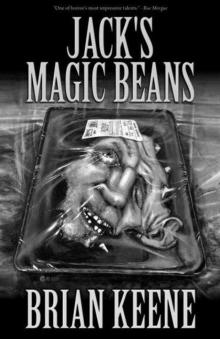 Jacks Magic Beans
Jacks Magic Beans Ghost Walk
Ghost Walk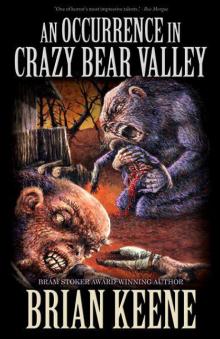 An Occurrence in Crazy Bear Valley
An Occurrence in Crazy Bear Valley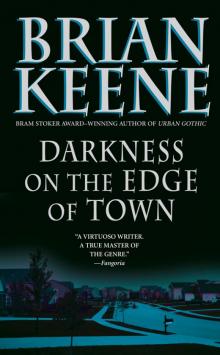 Darkness on the Edge of Town
Darkness on the Edge of Town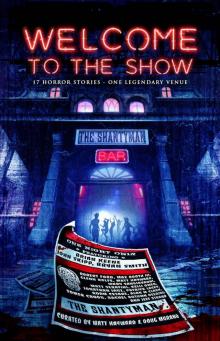 Welcome to the Show: 17 Horror Stories – One Legendary Venue
Welcome to the Show: 17 Horror Stories – One Legendary Venue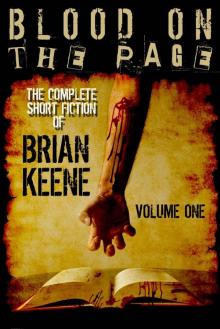 Blood on the Page: The Complete Short Fiction of Brian Keene, Volume 1
Blood on the Page: The Complete Short Fiction of Brian Keene, Volume 1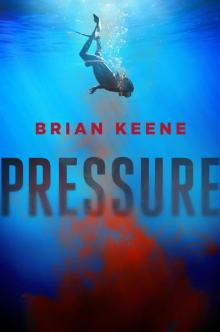 Pressure
Pressure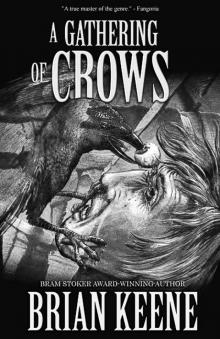 A Gathering of Crows
A Gathering of Crows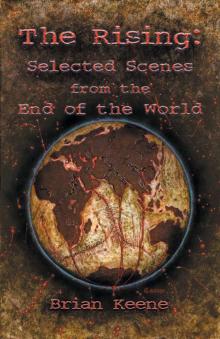 The Rising: Selected Scenes From the End of the World
The Rising: Selected Scenes From the End of the World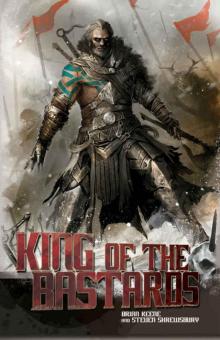 King of the Bastards
King of the Bastards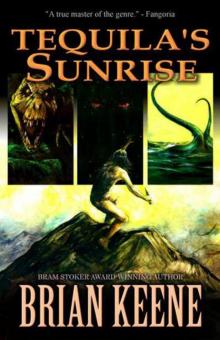 Tequila's Sunrise
Tequila's Sunrise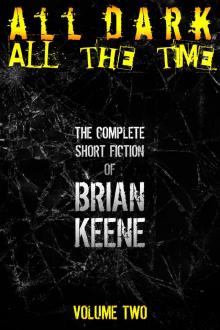 All Dark, All the Time
All Dark, All the Time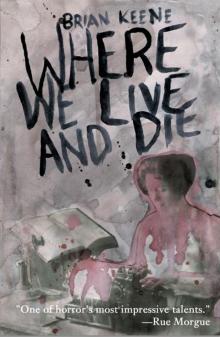 Where We Live and Die
Where We Live and Die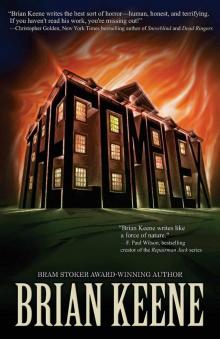 The Complex
The Complex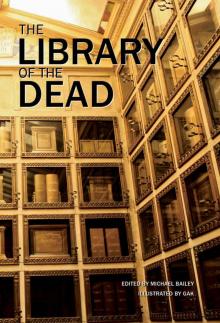 The Library of the Dead
The Library of the Dead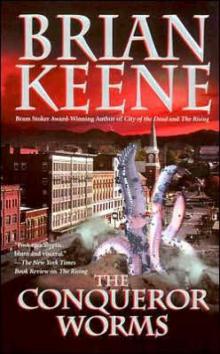 The Conqueror Worms
The Conqueror Worms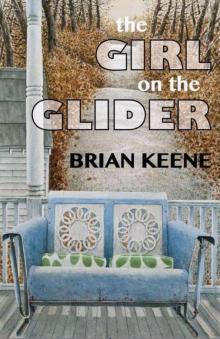 The Girl on the Glider
The Girl on the Glider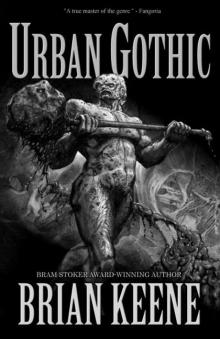 Urban Gothic
Urban Gothic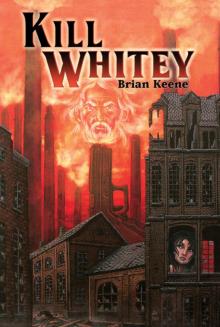 Kill Whitey
Kill Whitey Terminal
Terminal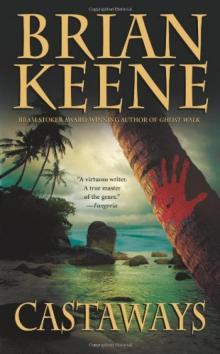 Castaways
Castaways